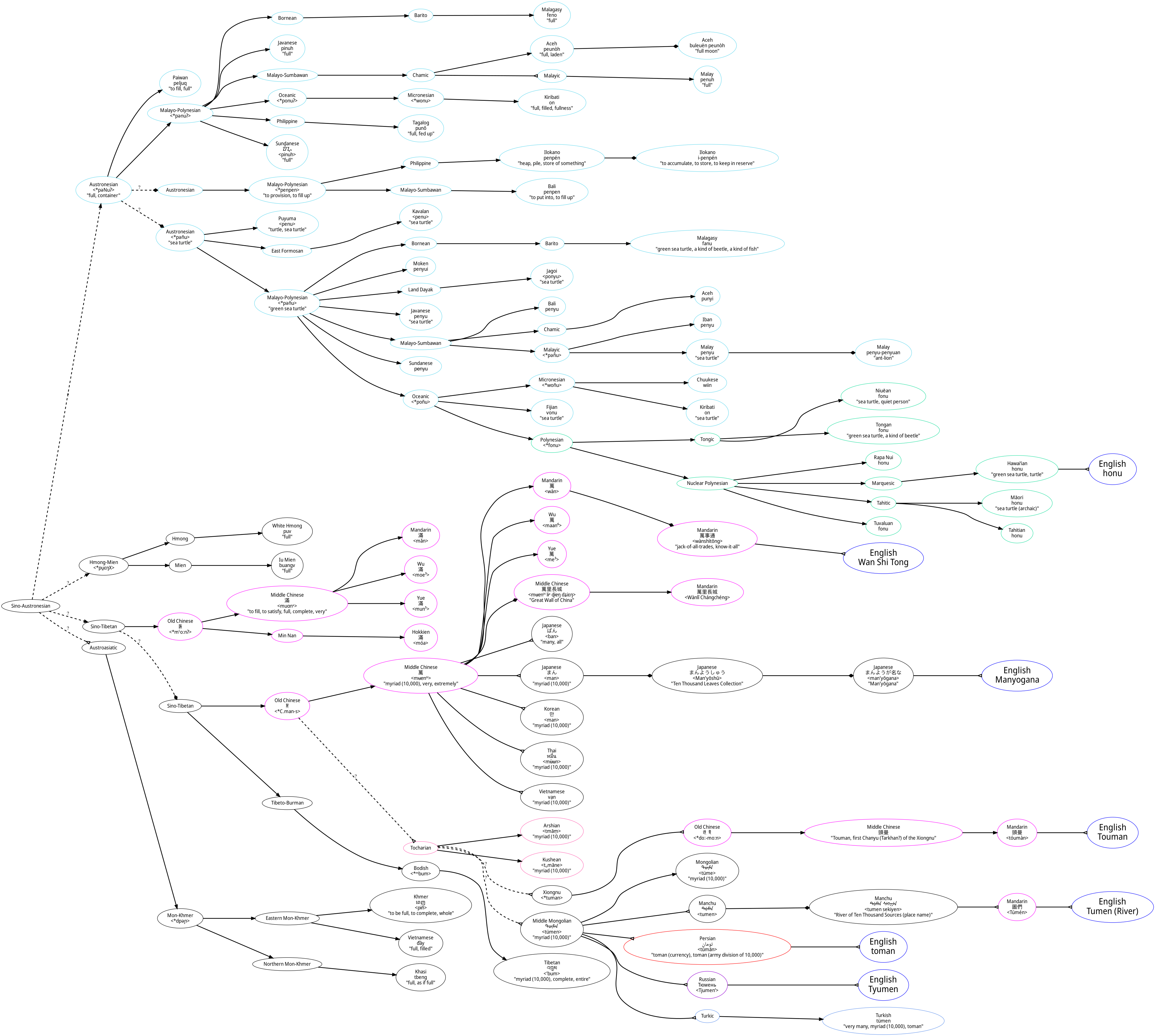Introduction
One final "turtle" word: "honu"
It is very tempting to unify *pəñu: "sea turtle" with *pəNuʔ: "to fill, full, container". And *pəNuʔ: "full" has potential cognates in the possible Sino-Austronesian macrofamily/Southeast Asian historic sprachbund.
And then at that point you're speculating a link between "green sea turtles" and "an army of 10,000 Mongolians", and you start to wonder if you've lost the thread.
Teaser
Full Text
-
Sino-Austronesian
-
Austronesian *pəNuʔ full, container [1]
- Paiwan peljuq to fill, full
-
Malayo-Polynesian *pənuʔ
-
Bornean
-
Barito
- Malagasy feno full
-
- Javanese pinuh full
-
Malayo-Sumbawan
-
Chamic
-
Aceh peunòh full, laden
- Aceh buleuën peunòh full moon
-
Malayic
- Malay penuh full
-
-
-
Oceanic *ponuʔ
-
Micronesian *wonu
- Kiribati on full, filled, fullness
-
-
Philippine
- Tagalog punô full, fed up
- Sundanese ᮕᮤᮔᮥᮂ pinuh full
-
-
Austronesian
-
Malayo-Polynesian *penpen to provision, to fill up
-
Philippine
-
Ilokano penpén heap, pile, store of something
- Ilokano i-penpén to accumulate, to store, to keep in reserve
-
-
Malayo-Sumbawan
- Bali penpen to put into, to fill up
-
-
-
Austronesian *pəñu sea turtle [1]
- Puyuma penu turtle, sea turtle [2]
-
East Formosan
- Kavalan penu sea turtle
-
Malayo-Polynesian *pəñu green sea turtle
-
Bornean
-
Barito
- Malagasy fanu green sea turtle, a kind of beetle, a kind of fish [2]
-
- Moken penyui
-
Land Dayak
- Jagoi ponyu sea turtle
- Javanese penyu sea turtle
-
Malayo-Sumbawan
- Bali penyu
-
Chamic
- Aceh punyi
-
Malayic *pəñu
- Iban penyu
-
Malay penyu sea turtle
- Malay penyu-penyuan ant-lion
- Sundanese penyu
-
Oceanic *poñu
-
Micronesian *woñu
- Chuukese wiin
- Kiribati on sea turtle
- Fijian vonu sea turtle
-
Polynesian *fonu
-
Tongic
- Niuēan fonu sea turtle, quiet person
- Tongan fonu green sea turtle, a kind of beetle [2]
-
Nuclear Polynesian
- Rapa Nui honu
-
Marquesic
-
Hawaiʻian honu green sea turtle, turtle
- English honu
-
-
Tahitic
- Māori honu sea turtle (archaic)
- Tahitian honu
- Tuvaluan fonu
-
-
-
-
Hmong-Mien *pu̯ɛŋX
-
Hmong
- White Hmong puv full
-
Mien
- Iu Mien buangv full
-
-
Sino-Tibetan
-
Old Chinese 满 *mˤoːnʔ
-
Middle Chinese 滿 muɑnˣ to fill, to satisfy, full, complete, very
- Mandarin 滿 mǎn
- Wu 滿 moe³
- Yue 滿 mun⁵
-
Min Nan
- Hokkien 滿 móa
-
-
Sino-Tibetan
-
Old Chinese 万 *C.man-s
-
Middle Chinese 萬 mʉɐnᴴ myriad (10,000), very, extremely
-
Mandarin 萬 wàn
-
Mandarin 萬事通 wànshìtōng jack-of-all-trades, know-it-all lit. "10,000 things expert"
- English Wan Shi Tong
-
- Wu 萬 maan⁶
- Yue 萬 me³
-
Middle Chinese 萬里長城 mʉɐnᴴ lɨˣ ɖɨɐŋ dʑiᴇŋ Great Wall of China literally "Ten Thousand Mile Long Wall"
- Mandarin 萬里長城 Wànlǐ Chángchéng
- Japanese ばん ban many, all
- Korean 만 man myriad (10,000)
- Thai หมื่น mʉ̀ʉn myriad (10,000)
- Vietnamese vạn myriad (10,000)
-
-
Tocharian
- Arshian tmāṃ myriad (10,000)
- Kushean tᵤmāne myriad (10,000)
-
Xiongnu *tuman
-
Old Chinese 头曼 *doː-moːn
-
Middle Chinese 頭曼 Touman, first Chanyu (Tarkhan?) of the Xiongnu
-
Mandarin 頭曼 tóumàn
- English Touman
-
-
-
-
Middle Mongolian ᠲᠦᠮᠡᠨ tümen myriad (10,000)
- Mongolian ᠲᠦᠮᠡ tüme myriad (10,000)
-
Manchu ᡨᡠᠮᡝᠨ tumen
-
Manchu ᡨᡠᠮᡝᠨ ᠰᡝᡴᡳᠶᡝᠨ tumen sekiyen River of Ten Thousand Sources (place name)
-
Mandarin 圖們 Túmén
- English Tumen (River)
-
-
-
Persian تومان tūmān toman (currency), toman (army division of 10,000)
- English toman
-
Russian Тюмень Tjumenʹ
- English Tyumen
-
Turkic
- Turkish tümen very many, myriad (10,000), toman
-
-
Tibeto-Burman
-
Bodish *ᵐbum
- Tibetan འབུམ 'bum myriad (10,000), complete, entire
-
-
-
-
Austroasiatic
-
Mon-Khmer *dpəɲ
-
Eastern Mon-Khmer
- Khmer ពេញ pɨñ to be full, to complete, whole
- Vietnamese đầy full, filled
-
Northern Mon-Khmer
- Khasi tbeng full, as if full
-
-
-
Visual
Collected English words
honu, Wan Shi Tong, Manyogana, Touman, Tumen (River), toman, Tyumen
Footnotes
-
^
Regarding the link from *pəNuʔ: "to fill, full, container" to *pəñu: "sea turtle".
Phonologically: In Wolff's reconstruction, *ñ and *N are the same phoneme. /n/ is the expected reflex of *N in Kavalan penu, but Puyuma would be expected to have l. But there are several reason to think Puyuma penu may be a borrowing from East Formosan. If so, peñu: "turtle" is restricted to East Formosan and Malayo-Polynesian, which are good candidates for a subgrouping within Austronesian.
Semantically: In many language, *pəñu refers specifically to the green sea turtle, which is valuable for its meat and eggs. Turtles valued for meat and eggs seem like a reasonably semantic connection to "to fill, full, container". Especially if *penpen: "to provision, to fill up" is included.
-
^
A meaning of a specific kind of beetle, in addition to green sea turtle, is present in both Malagasy fanu and Tongan fonu, which are not closely related within Malayo-Polynesian. This could reflect an original polysemy, or just convergent development of calling beetles "little turtles".
-
^
Man'yōshū, literally "the Collection of Ten Thousand Leaves", is a 7th/8th C collection of Old Japanese poetry.
The first Japanese kana system is named after it: まんようがな Man'yōgana: "the Letters of the Thousand Leaves". Man'yōgana is the predecessor of the modern Katakana and Hiragana systems.
